August 2, 2010 – Music Programme by Devotees from Southern Europe
 |
In Telugu there is a saying “Nithya Kalyanam Pacha Toranam” which means everyday is a celebration. And this is so true for Prasanthi Nilayam, the unparalleled divine hamlet of the present times where every sunrise brings along with it a storehouse of lovely moments with eternity. It was more so from July 1, 2010 from which day literally almost every single evening there was a cultural programme presented in front of Bhagavan, either by devotees from different states of India or various regions of the world. On August 2 it was the opportunity for the devotees from Southern Europe.
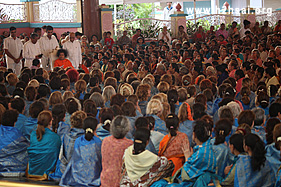 |
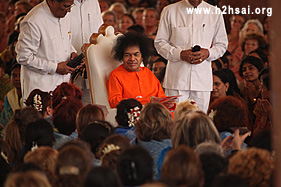 |
The marbled block in front of the dais was occupied by hundreds of devotees from the countries of Bosnia and Herzegovina, Croatia, France, Greece, Italy, Macedonia, Serbia, Slovenia, Spain and Switzerland.
[Go here to read about the Sai Movement in Switzerland and the uplifting experience of a Sai Youth from Croatia from H2H Archives]
Their faces lit up and turned towards the west the moment darshan music and vedam chanting began simultaneously at 5.45 p.m. As the Lord arrived seated majestically in His white and gold throne, there was anticipation and joy in every heart. When Swami came near the European devotees smiles radiated from His being and He gladly collected many letters from both sides of the aisle. A fulfilling sense of happiness and bliss permeated the faces of these pilgrims who had come from thousands of miles away.
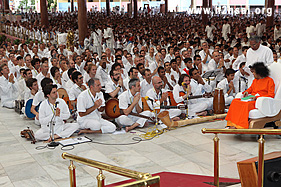 |
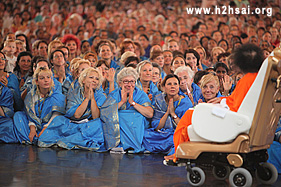 |
Like everyday, Swami covered the entire round on the gents’ side, stopping at various spots to collect letters, console hearts and confer blessings. That day’s birthday boys too had their memorable moments as He took yellow grains from one cup and sprinkled a little on all even as these boys gently touched His lotus feet.
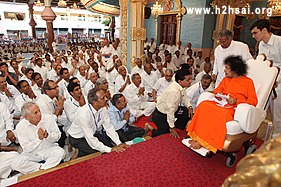 |
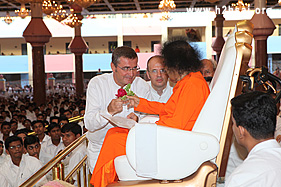 |
Swami then went onto the portico and blessings continued as He accepted prayers and petitions from many on the veranda, and finally as He slowly ascended the stage He lovingly spoke a word or two with a few guests. These gentlemen were special invitees for the workshop on ‘Innovation and Leadership for Business, Governance and Community’ organized by the School of Business Management, Accounting and Finance of Swami’s university.
Among this group were Mr. N. Chandrasekharan, CEO of Tata Consultancy Services (TCS), Mr. Jagadish Kapur, Chairman, HDFC Bank, Mr. B. Prasad Rao, Managing Director, BHEL, Mr. R. C. Bhargava, Chairman, Maruti Suzuki Ltd. and a few others.
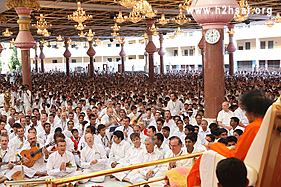 |
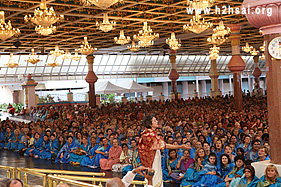 |
That morning they had attended the inaugural session of this workshop in the college premises where the key note address was delivered by Dr. R. Chidamabaram, the current Chief Security Advisor to the Government of India and former Chancellor of Hyderabad Central University. Interestingly the next day on schedule was an e-presentation from Chicago by Mr. Sam Pitroda, the current Advisor to the Prime Minister of India on Public Information Infrastructure and Innovations.
Coming back to the evening of August 2, after Swami blessed these eminent speakers, He took His position on the stage. Soon He indicated for the vedam chanting to stop and looked to His right. Immediately the coordinators for the evening programme rose and presented to Him flowers and a booklet which had the list of songs that were to be sung. Another member from the ladies side offered a beautiful bouquet which the Lord accepted so kindly. And then Swami nodded gently for the performance to begin. The next moment Sai Kulwant Hall reverberated with Om chanted three times in perfect unison and fervour followed by a small vedic hymn.
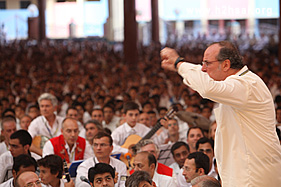 |
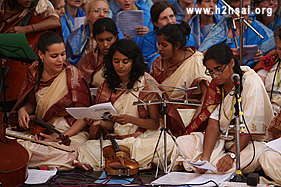 |
As this ended, the conductor for the first song of the evening stood up and the choir began. It was an English song about purity, light and joy. “And let it shine, and let it shine, in the heart of mine, Love Divine…” they sang in chorus. One could really see the joy and love for God shine in their bright faces as every member of the group joined in with an enthusiasm that was magnificent and moving. As this was going on Swami seemed to indicate to the people in front that there was no prior announcement made before the singing commenced.
And so as soon as the first song concluded one member of the group took the mike and expressed his gratitude to Bhagavan on behalf of the Sai devotees gathered from the ten South European nations for permitting them to humbly offer a garland of songs. He also mentioned that most of the songs were in local languages and they were outpourings of love for the country, Nature and the Lord.
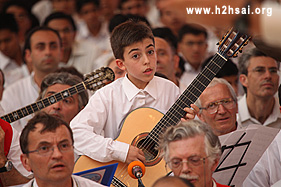 |
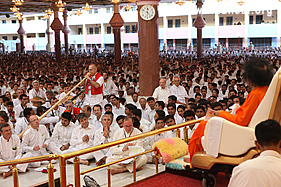 |
He then introduced the next song called “Potpourri” which was a scintillating medley in Italian. With vibrant beats and tunes that changed with every stanza, this piece kept the audience spellbound. Swami too looked keenly intermittently at the singers and at the booklet in His hand. Like Love, music too knows no barriers of language. Even though the lyrics were in a tongue foreign to most of the devotees gathered in the hall, it was obvious that every individual present was rejoicing and relishing the lively melodies.
As this song concluded the next one, it was announced, would be a Swiss song “De frohe Senn” which described a shepherd like Lord Krishna, happy to be in the mountains with His cows. And then, a red-jacketed elderly gentleman stood up and held a pipe which was almost three feet long. The next moment, he breathed into this long wind instrument, and a sonorous and sublime tune filled the air transporting many to the sylvan bliss of hills and valleys. Soon after this introductory music, the joyful song started.
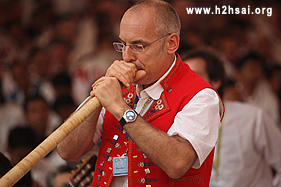 |
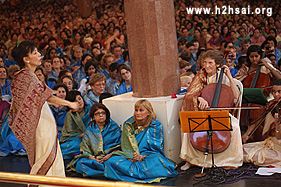 |
This was followed by a Spanish devotional song “Salve Rociera” which is generally sung to the Virgin of Rocia as an offering of love to the Divine Mother. This song had in it the famous Spanish word “Ole” which is an expression of deep feeling, and the singers indeed made full justice to this phrase as they sang with vigour and emotion effortlessly alternating between high and low notes. This one too captured every ear and at the end of this bubbly melody a sweet smile blossomed on His lips.
The next was a song in French which reflected the pilgrimage of souls that are searching for their true home. The devotees sang that they had in fact reached their true home – Prasanthi Nilayam. After French was Greek, and this piece entitled “Get Up and Dance Syrtaki” was a typical folklore Syrtaki dance (a popular dance of Greek origin) song and it was again unique because it was accompanied by Bouzouki, a traditional Greek instrument (Bouzouki, which looks similar to mandolin but has a long neck, is in fact the mainstay of modern Greek music).
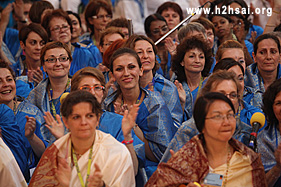 |
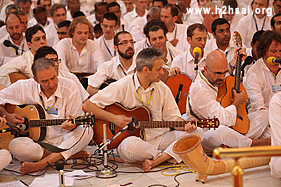 |
The powerful and pacy rhythms from this pear-shaped stringed instrument added a new dimension to that evening’s program and as this song continued everyone in the audience started clapping, fully in tune with its lively cadence, and once it ended this clapping morphed into a thunderous applause.
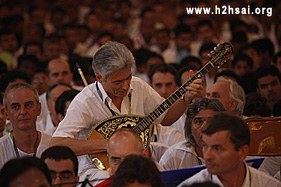 |
There were different conductors for each song and all of them were ladies except one. For the seventh song which was again in English like the first one, the male conductor took over once more and one could not but gaze at him. The passion and the finesse with which he went about doing his job was truly laudable. This song was actually the theme song of the European Youth Project “Love All Serve All” and it spoke about the journey from humanity to divinity. Swami again blessed all with a gentle smile as this musical offering ended.
The next song was the second one in Spanish which was composed to the rhythm of Buleria, which is one of the most important tempos of the famous Flamenco music (part of Spanish culture). The lyrics exalted there is no “You” or “I” but only God. After this interesting piece, there was another song in Greek entitled “The Myrtle Tree – Hartaetoi” and again the strings of Bouzouki filled the air to everyone’s delight. This song talked about the spiritual quest of a person seeking to build a sanctuary of love and the song’s verses were dedicated to Swami adoring Him as their Mother and Father.
The Lord seemed satisfied and smiled as this song concluded, and then seemed to ask “Is it over?” But the choir members who did not get this hint clearly went ahead with their next song which was actually the popular bhajan “Dam Dam Dam Dam Damaru Bhaje”. Given the familiarity with this bhajan the audience clapped and participated whole heartedly.
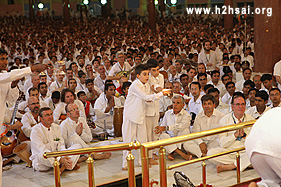 |
After this was the final short closing refrain “Love All Serve All” sung in unison and harmony. As the programme concluded, the organizers went to Swami with baskets draped in golden hues filled with prasadam. Swami in fact picked one of these sweets, opened the packet and made a sweet expression as if to say “Oh! This is nice!”
He blessed all the four baskets and watched keenly as the sweet packs were distributed to the choir participants and others from the South European nations.
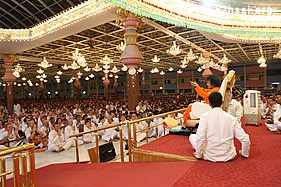 |
As this was going on one of the organizers asked Swami if they could sing bhajans, and Swami readily agreed. And so started “Gajavadana Gananatha Gajavadana Vinayaka” followed by “Devi Bhavani Maa” which the Europeans sang with as much ease as they rendered songs in Spanish or Greek.
After this, Bhagavan asked for arathi and there were three arathis being performed, one of course by the Mandir priest, the second by a student which too is common every evening. The third one was being offered together by two European tiny tots. The Lord watched them keenly as they waved the camphor fire slowly in circles, and after two stanzas of arathi, the concerned Lord asked the little ones to place the fire down and be seated.
As the arathi ended and the universal prayer “Samastha Loka…” was being chanted, the sweet lord raised both His hands in blessing once for the gents and again for the ladies. That moment is probably one that will ever remain in the heart of every devotee present that evening, especially the ones from Europe - the privileged lot of the day. Soon after this, Swami retired to Yajur Mandir in His car even as every face strained to have one last glimpse of His blissful form.
Dear reader, how do you like this section? Does it help or inspire you in anyway? Please share your reflections with us by writing to h2h@radiosai.org mentioning your name and country.
Thank you for your time.




